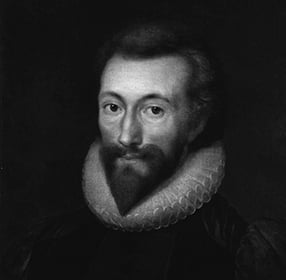Love’s Growth
I scarce believe my love to be so pure
As I had thought it was,
Because it doth endure
Vicissitude, and season, as the grasse;
Methinks I lied all winter, when I swore,
My love was infinite, if spring make’it more.
But if this medicine, love, which cures all sorrow
With more, not onely bee no quintessence,
But mixt of all stuffes, paining soule, or sense,
And of the Sunne his working vigour borrow,
Love’s not so pure, and abstract, as they use
To say, which have no Mistresse but their Muse,
But as all else, being elemented too,
Love sometimes would contemplate, sometimes do
And yet no greater, but more eminent,
Love by the spring is grown;
As, in the firmament,
Starres by the Sunne are not inlarg’d, but showne,
Gentle love deeds, as blossomes on a bough,
From love’s awakened root do bud out now.
If, as in water stir’d more circles bee
Produc’d by one, love such additions take,
Those like so many spheares, but one heaven make,
For, they are all concentrique unto thee,
And though each spring doe adde to love new heate,
As princes do in times of action get
New taxes, and remit them not in peace,
No winter shall abate the spring’s encrease.
This poem is in the public domain. Published in Poem-a-Day on January 27, 2024, by the Academy of American Poets.
“Love’s Growth” was originally published in Poems (John Marriott, 1633), the first comprehensive publication of John Donne’s poetry. In “The Muse in Donne and Jonson: A Post-Lacanian Study,” published in Modern Language Studies, vol. 21, no. 4 (Fall 1991), Mark Fortier, a professor in the School of English and Theatre Studies at the University of Guelph, Canada, writes (commenting on the last four lines of the second stanza), “The relation of poet and Muse is contrasted, derisively, to the relation between real lovers, which is Donne’s true subject. Where real love is complex and organic, love of the Muse is unreal, devoid of complexity, devoid of life. Love of the Muse is inactive: those who love, do; those who can’t, call on the Muse. Paradoxically the poetic ego identifies itself, at least here, with those who can. There is an estrangement from the Muse, an inability to sympathize with those who value her. To a large extent this will be the primary relationship between the poet and the Muse throughout Donne’s work: the poet never feels close to, never values his own Muse, although sometimes he can respect the Muse of others.”

